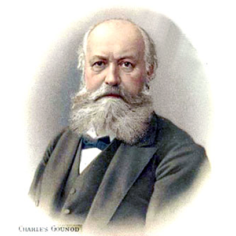About author : GOUNOD Charles

Charles-François Gounod, 17 June 1818 – 17 October or 18 October 1893, was a French composer, known for his Ave Maria (based on a work by Bach) as well as his operas Faust and Roméo et Juliette.
Gounod was born in Paris, the son of a pianist mother and an artist father. His mother was his first piano teacher. Under her tutelage, Gounod first showed his musical talents. He entered the Paris Conservatoire, where he studied under Fromental Halévy and Pierre Zimmermann (he later married Zimmermann's daughter).
In 1839, he won the Prix de Rome for his cantata Fernand. He was following his father; François-Louis Gounod (d. 1823) had won the second Prix de Rome in painting in 1783. During his stay of four years in Italy, Gounod studied the music of Palestrina and other sacred works of the sixteenth century; these he never ceased to cherish. Around 1846-47 he gave serious consideration to joining the priesthood, but he changed his mind before actually taking holy orders, and went back to composition. During that period, he was attached to the Church of Foreign Missions in Paris.
In 1854, Gounod completed a Messe Solennelle, also known as the Saint Cecilia Mass. This work was first performed in its entirety in the church of St Eustache in Paris on Saint Cecilia's Day, 22 November 1855; from this rendition dates Gounod's fame as a noteworthy composer. Gounod late in his career. During 1855 Gounod wrote two symphonies. His Symphony No. 1 in D major was the inspiration for the Symphony in C, composed later that year by Georges Bizet, who was then Gounod's 17-year-old student.
Gounod wrote his first opera, Sapho, in 1851, at the urging of a friend of his, the singer Pauline Viardot; it was a commercial failure. He had no great theatrical success until Faust (1859), derived from Goethe. This remains the composition for which he is best known; and although it took some time to achieve popularity, it became one of the most frequently staged operas of all time, with no fewer than 2,000 performances of the work having taken place by 1975 at the Paris Opéra alone, not counting other theatres
The romantic and melodious Roméo et Juliette (based on the Shakespeare play Romeo and Juliet), premiered in 1867, is revived now and then but has never come close to matching Faust's popular following. Mireille, first performed in 1864, has been admired by connoisseurs rather than by the general public. The other Gounod operas have fallen into oblivion.
From 1870 to 1874 Gounod lived in England. He became the first conductor of what is now the Royal Choral Society. Much of his music from this time is vocal. He became entangled with the amateur English singer Georgina Weldon, a relationship (platonic, it seems) which ended in great acrimony and embittered litigation. Gounod had lodged with Weldon and her husband in London's Tavistock House. Later in his life, Gounod returned to his early religious impulses, writing much sacred music. His Pontifical Anthem (Marche Pontificale, 1869) eventually (1949) became the official national anthem of Vatican City. He expressed a desire to compose his Messe à la mémoire de Jeanne d'Arc (1887) while kneeling on the stone on which Joan of Arc knelt at the coronation of Charles VII of France.[
A devout Catholic, he had on his piano a music-rack in which was carved an image of the face of Jesus. He was made a Grand Officer of the Légion d'honneur in July 1888.
In 1893, shortly after he had put the finishing touches to a requiem written for his grandson, he died of a stroke in Saint-Cloud, France.


